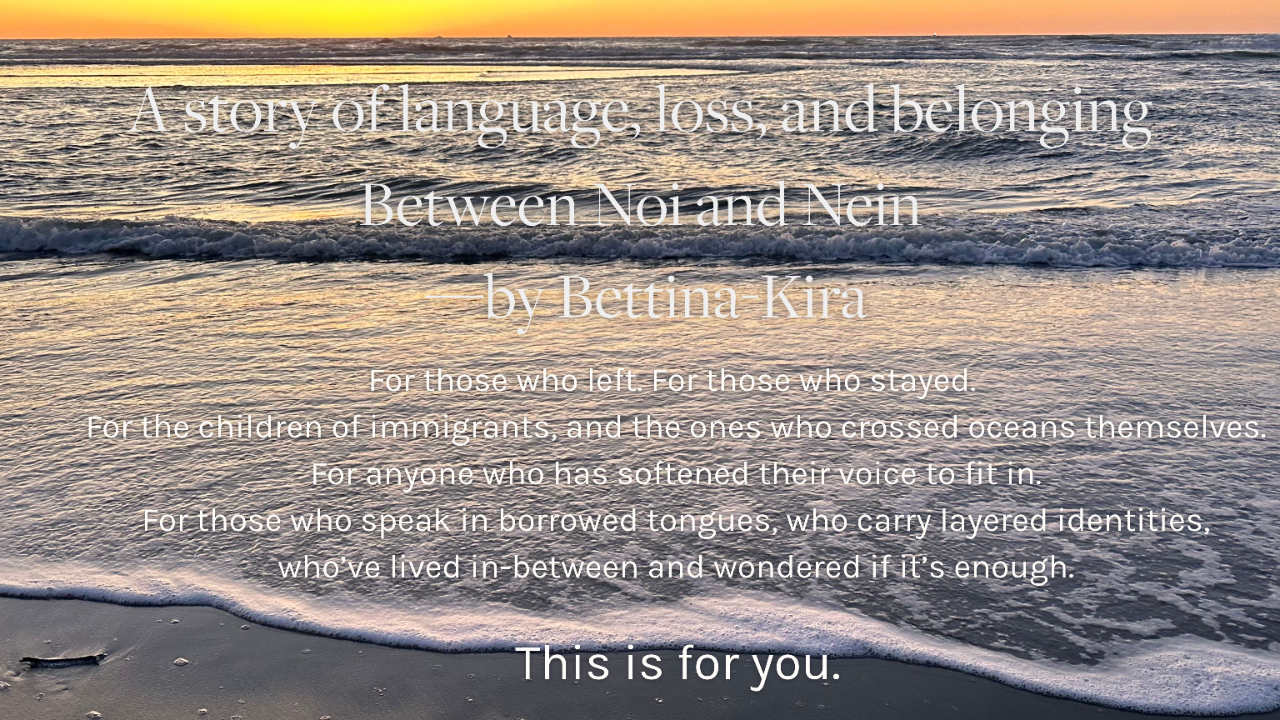Between Noi and Nein: The Places I Tried to Belong
Jun 16, 2025
I’ve been sitting with this feeling again — the one that comes when the world feels uncertain, and you’re not quite sure where you belong.
Lately, it’s been showing up in language.
In old words. In dialect. In memory.
In the ways I once tried to fit in — softening my accent, changing how I spoke, just to be accepted.
This piece came out of that space — the space between “Noi” and “Nein.”
Between cultures, between places, between being at home and still somehow on the outside.
It’s personal, but I know I’m not alone in this.
Especially right now — in this “No King” world where so much is being questioned — I think a lot of us are asking:
Who gets to belong?
Who gets to be heard?
Who decides what's “enough”?
So I’m sharing this story from my own life, hoping it lands somewhere meaningful for you too.
Between Noi and Nein: The Places I Tried to Belong
They teased me when I said “Nein.”
Laughed, corrected me — “Noi!”
As if that one vowel meant I didn't belong.
But “Nein” was my mother.
“Nein” was the Elsass kitchen and the way she reached for things.
“Nein” was the rhythm I grew up with —
in the quiet folds of our family dialect.
We weren’t from here, not fully.
We lived im Schwobaländle, yes —
but my father was East Prussian,
my mother Alsatian,
and our language lived in the cracks between.
I spoke Swabian, yes.
But with my sisters, we spoke our dialect.
The family tongue.
The one no one else quite knew —
where we’d say: “Jetzt geh mr heim.”
Not textbook.
Not fancy.
Just home.
And when I came to America —
I tried again.
To fit in.
To flatten the accent.
To tuck the German away,
to pronounce “th” and “w” like they belonged in my mouth.
Not because I was fleeing war or hardship.
But because life brought me here.
And then... I stayed.
Still — the hiding stayed with me.
Even as I claimed my place.
Even as I became fluent.
Because there’s a thing that happens when you speak from the in-between:
You learn to shift.
To mirror.
To mold.
You start to believe that fitting in means dimming down.
And then one day — someone says:
“How long did your father live here?”
“Fifty years,” I say.
And they respond, like it’s simple:
“Dann ischer a Schnoidemer.”
And I freeze.
Because suddenly the rules change.
Belonging is declared — by someone else.
Like you have to earn it.
Like time can undo roots.
But deep inside me is still that girl who said “Nein,”
and was told “Noi.”
Still that woman who danced between religions, regions, tongues —
not quite Catholic, not quite from here,
not quite from there either.
And now?
Now I hold them all.
The bruddla.
The Heim.
The Feir and the home,
and the bits of language I once tried to smooth away.
Because this in-between isn’t a mistake.
It’s a homeland of its own.
Join the Aurras Circle
Receive monthly somatic reflections, early event invites, and practices to help you return to your body.
No spam, no pressure — just rhythm, breath, and story.
We hate SPAM. We will never sell your information, for any reason.

